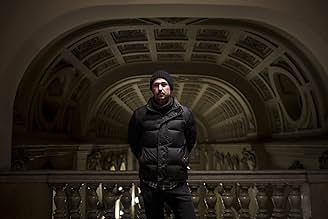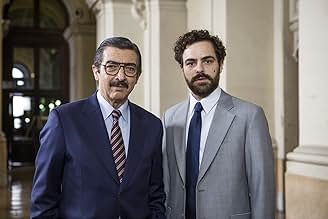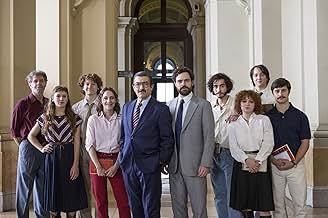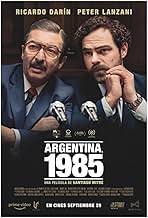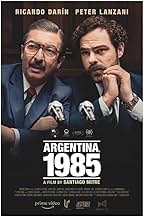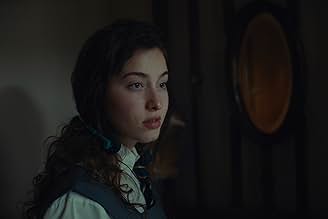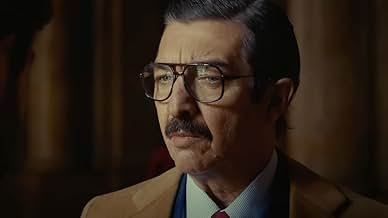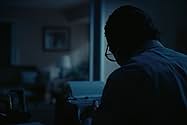VALUTAZIONE IMDb
7,6/10
34.558
LA TUA VALUTAZIONE
Una squadra di avvocati affronta la sanguinosa dittatura militare argentina negli anni '80 in una battaglia contro le probabilità e una corsa contro il tempo.Una squadra di avvocati affronta la sanguinosa dittatura militare argentina negli anni '80 in una battaglia contro le probabilità e una corsa contro il tempo.Una squadra di avvocati affronta la sanguinosa dittatura militare argentina negli anni '80 in una battaglia contro le probabilità e una corsa contro il tempo.
- Regia
- Sceneggiatura
- Star
- Candidato a 1 Oscar
- 49 vittorie e 45 candidature totali
Gabriel Martín Fernández
- Bruzzo
- (as Gabriel Fernández)
Riepilogo
Reviewers say 'Argentina, 1985' is a powerful film exploring Argentina's military dictatorship trial. It is lauded for strong performances, especially Ricardo Darín, and its emotional engagement. Critics appreciate the balance of tension, humor, and historical accuracy, though some find lacking depth in character development and context. The cinematography and direction effectively capture the era's atmosphere. Despite minor critiques on pacing and bias, it is seen as an important, impactful work resonating with audiences familiar with Argentina's history.
Recensioni in evidenza
Argentina undergoes the biggest civilian trial in its history by putting in the dock the military officers who ruled the country for years, who, in their effort to subdue the guerrillas, orchestrated one of the harshest genocides in recent history: kidnappings, tortures and murders that were to go unpunished.
Because of its political plot, the film will generate different results in the viewer, mainly among Argentines. One character is saved, Attorney General Stassera, showing an integrity that is a great inspiration. However, for those who know the details of the real story and even more for those who have lived through it, these stories with a clear political hero always leave someone with a bad taste in their mouth.
On the other hand, considering that this is a trial that many viewers may not be aware of, the film's plot is well-developed if somewhat lengthy.
The drama is both entertaining and tough, as is so often the case with Argentine films starring Darín.
The camera play is good, to the point that it is difficult to distinguish the historical shots from the fictional ones. The characters are very well chosen.
Undoubtedly, Darín's performance, once again, is among the best in this feature film. He supports the rest of the actors - the family scenes are practically his - leads them as he wants and always leaves that humorous tone of fine irony in all his gestures.
A remarkable film that can be recommended to a minimally serious audience.
Because of its political plot, the film will generate different results in the viewer, mainly among Argentines. One character is saved, Attorney General Stassera, showing an integrity that is a great inspiration. However, for those who know the details of the real story and even more for those who have lived through it, these stories with a clear political hero always leave someone with a bad taste in their mouth.
On the other hand, considering that this is a trial that many viewers may not be aware of, the film's plot is well-developed if somewhat lengthy.
The drama is both entertaining and tough, as is so often the case with Argentine films starring Darín.
The camera play is good, to the point that it is difficult to distinguish the historical shots from the fictional ones. The characters are very well chosen.
Undoubtedly, Darín's performance, once again, is among the best in this feature film. He supports the rest of the actors - the family scenes are practically his - leads them as he wants and always leaves that humorous tone of fine irony in all his gestures.
A remarkable film that can be recommended to a minimally serious audience.
As Argentina begins reckoning with the violent torture and murder of its people by a ruthless military junta from 1976 to 1983, the task falls to prosecutor Julio Strassera (Darin) to prosecute the dictators. The constant death threats are shrugged off by his wife Silvia (Flechner) and children, and his deputy Luis (Lanzani) has no experience but a sharp mind. They assemble an unusually young team and set out to gather evidence of 709 specific crimes, representing thousands. But it seems unthinkable that these still-powerful armed forces leaders will ever be sent to prison.
Witty interaction gives the film a surprising electrical charge, making darker elements even more devastating. Without going into too much detail regarding torture, what's described is absolutely horrific, and scale could have been mind-numbing without such personal filmmaking. This also helps us identify vividly with characters, while seeing this situation echoed in present-day politics as former heads of state face consequences for actions taken when they felt above the law.
Veteran actor Darin makes Julio feel wonderfully competent; even when he's unsure, we know he's on the right track. His sardonic comments bring harsh things into perspective, and he has wonderfully abrasive camaraderie with his family and colleagues, drawing both strength and inspiration. His partnership with the likeable Lanzani's whip-smart Luis develops beautifully over the case. And as Silvia, Flechner adds fabulously sardonic moments that run very deep. Meanwhile, Paredes gets a show-stealing role as a key witness who resiliently recounts a staggering ordeal.
These true events are important in world history, a pivotal change in how leaders are held to account, eventually. A line in the film equates this trial with Nuremberg, but this is perhaps even more earth-shaking. And what sets this film apart is the way a young legal team bonds over their desire to set the historical record straight, because they are the ones who will inherit the leadership of their country. They want it to be a just place to live. Obviously, they're not there yet, but this first step was massive.
Witty interaction gives the film a surprising electrical charge, making darker elements even more devastating. Without going into too much detail regarding torture, what's described is absolutely horrific, and scale could have been mind-numbing without such personal filmmaking. This also helps us identify vividly with characters, while seeing this situation echoed in present-day politics as former heads of state face consequences for actions taken when they felt above the law.
Veteran actor Darin makes Julio feel wonderfully competent; even when he's unsure, we know he's on the right track. His sardonic comments bring harsh things into perspective, and he has wonderfully abrasive camaraderie with his family and colleagues, drawing both strength and inspiration. His partnership with the likeable Lanzani's whip-smart Luis develops beautifully over the case. And as Silvia, Flechner adds fabulously sardonic moments that run very deep. Meanwhile, Paredes gets a show-stealing role as a key witness who resiliently recounts a staggering ordeal.
These true events are important in world history, a pivotal change in how leaders are held to account, eventually. A line in the film equates this trial with Nuremberg, but this is perhaps even more earth-shaking. And what sets this film apart is the way a young legal team bonds over their desire to set the historical record straight, because they are the ones who will inherit the leadership of their country. They want it to be a just place to live. Obviously, they're not there yet, but this first step was massive.
A bracingly riveting legal drama that sheds informative light on the historic Trial of the Juntas and the painstaking work that went into its preparation, Argentina, 1985 narrates the strategy of the attorney chosen to prosecute the ones responsible for the bloodiest dictatorship in Argentine history. Smartly crafted & strongly acted, the film is engrossing for the most part yet not realised to its full potential.
Co-written & directed by Santiago Mitre, the story covers the legal challenges & constant death threats that the lead prosecutor faces along with his personal demons while preparing the case. The courtroom proceedings are shot with finesse, those real-life testimonies provide a powerful, disturbing & heartbreaking account of the brutality of the dictatorial regime and they happen to be provocative enough to rile up viewers' emotions.
Despite the grim subject matter, humour surfaces on screen in the most unlikely of ways and is effectively carried out. But the plot also loses momentum every time it shifts focus from the main event to protagonist's own family life. Also, the prosecution team hardly faces any friction in the courtroom, for the back-n-forth plays that make this genre so captivating is missing here. But as expected, Ricardo Darín leads from the front with an assured input.
Overall, Argentina, 1985 illustrates the political climate of its period setting in meticulous detail and makes for a gripping dramatisation of a vital slice of Argentine history. Still, there was more up for grabs as despite the 140 mins runtime, the film feels like a surface level exploration than an in-depth investigation. Strengthened by top-notch performances from its cast & first-rate work from the crew, this Argentine offering ranks amongst the better films of 2022 and is a must-see.
Co-written & directed by Santiago Mitre, the story covers the legal challenges & constant death threats that the lead prosecutor faces along with his personal demons while preparing the case. The courtroom proceedings are shot with finesse, those real-life testimonies provide a powerful, disturbing & heartbreaking account of the brutality of the dictatorial regime and they happen to be provocative enough to rile up viewers' emotions.
Despite the grim subject matter, humour surfaces on screen in the most unlikely of ways and is effectively carried out. But the plot also loses momentum every time it shifts focus from the main event to protagonist's own family life. Also, the prosecution team hardly faces any friction in the courtroom, for the back-n-forth plays that make this genre so captivating is missing here. But as expected, Ricardo Darín leads from the front with an assured input.
Overall, Argentina, 1985 illustrates the political climate of its period setting in meticulous detail and makes for a gripping dramatisation of a vital slice of Argentine history. Still, there was more up for grabs as despite the 140 mins runtime, the film feels like a surface level exploration than an in-depth investigation. Strengthened by top-notch performances from its cast & first-rate work from the crew, this Argentine offering ranks amongst the better films of 2022 and is a must-see.
It's not easy to talk about one of the darkest periods in Argentina's history - including torture, rapes and deaths - and to do it in an appealing way that doesn't become too heavy or exploit the victims' suffering in an abusive way. It's not easy, but they did it.
The script by Llinás and Miter is quite refined, careful and intelligent in the way it addresses all the atrocities of the regime, always saying what it has to say, but it is also intelligent in the way it incorporates moments of humour, a personal and familiar dimension that helps us to identify with the characters, being able to transform everything that happened in one of the most important judgments in history into hope and a turning point. I'm not Argentine. I'm not an easy tear person. However, it is difficult to contain emotions in certain depositions or when in his closing arguments, prosecutor Straessera says "Nunca más" (Never Again). People who have lived under dictatorial regimes or who have heard the stories told by their parents or grandparents cannot remain indifferent to such a moment.
Santiago Miter's direction is super smart too. It's filmed soberly when necessary. It's filmed using movement and different techniques when the action requires it, such as in moments of greater tension, such as during a harrowing dinner with the Assistant Attorney, Luis Moreno Ocampo. The editing is also very efficient, helping a 140-minute film on such a heavy topic - and with much of its time spent in an investigation or in court - pass quickly, using several scenes on the screen at the same time, resorting to overlapping voices and testimonies, resorting to music whenever the film has something to extract from it, not seeming to do anything by chance.
Finally, it is impossible not to mention the excellent actors who make this film. All the supporting actors are at a good level, but the dynamic between Ricardo Darin (as the Attorney General) and Peter Lanzani (as the Assistant Attorney) is one of the highlights, always seeming true and honest, being easy to sympathize and cheer for those characters. Darin could very well have taken a more showy approach, but it is his sobriety and distinct personality that are his greatest strengths.
A must-see film for anyone who cares about the human condition and dignity. A film that recalls that certain pages of history must never be lived again. Nunca más!
The script by Llinás and Miter is quite refined, careful and intelligent in the way it addresses all the atrocities of the regime, always saying what it has to say, but it is also intelligent in the way it incorporates moments of humour, a personal and familiar dimension that helps us to identify with the characters, being able to transform everything that happened in one of the most important judgments in history into hope and a turning point. I'm not Argentine. I'm not an easy tear person. However, it is difficult to contain emotions in certain depositions or when in his closing arguments, prosecutor Straessera says "Nunca más" (Never Again). People who have lived under dictatorial regimes or who have heard the stories told by their parents or grandparents cannot remain indifferent to such a moment.
Santiago Miter's direction is super smart too. It's filmed soberly when necessary. It's filmed using movement and different techniques when the action requires it, such as in moments of greater tension, such as during a harrowing dinner with the Assistant Attorney, Luis Moreno Ocampo. The editing is also very efficient, helping a 140-minute film on such a heavy topic - and with much of its time spent in an investigation or in court - pass quickly, using several scenes on the screen at the same time, resorting to overlapping voices and testimonies, resorting to music whenever the film has something to extract from it, not seeming to do anything by chance.
Finally, it is impossible not to mention the excellent actors who make this film. All the supporting actors are at a good level, but the dynamic between Ricardo Darin (as the Attorney General) and Peter Lanzani (as the Assistant Attorney) is one of the highlights, always seeming true and honest, being easy to sympathize and cheer for those characters. Darin could very well have taken a more showy approach, but it is his sobriety and distinct personality that are his greatest strengths.
A must-see film for anyone who cares about the human condition and dignity. A film that recalls that certain pages of history must never be lived again. Nunca más!
Great true story that highlights why it's so important to have independent courts, that can't be bullied or harassed by anti democratic forces like the military in Argentina.
This movie should be shown in every classroom in all democratic countries. To vaccinate against anti democratic behavior!
A must see for all democratic and peace loving people, wherever they live.
It will also give hope for them who currently live in a evil country with dictatorship.
One day justice will be served and the good ones will win. It's only a matter of time, and the courage of good men and women who believes in justice!
This movie should be shown in every classroom in all democratic countries. To vaccinate against anti democratic behavior!
A must see for all democratic and peace loving people, wherever they live.
It will also give hope for them who currently live in a evil country with dictatorship.
One day justice will be served and the good ones will win. It's only a matter of time, and the courage of good men and women who believes in justice!
Lo sapevi?
- QuizAfter winning the Golden Globe for best non-English language film, fellow actor Peter Lanzani revealed that Ricardo Darín used his "lucky charm" for awards ceremonies and told the cast and crew to think, "Don't worry, we're not going to win, we have no chance, we're losers, be calm, we won't have to make a speech, we won't win."
- Blooper(at around 43 mins) The taxis of the time had a logo in the shape of a circle with an identification number on the front door. In this scene the taxis don't have any logo except the taxi sign on the roof.
- Citazioni
Julio César Strassera: History was not made by guys like me.
- Curiosità sui creditiPhotographs from the trial are shown in the credits.
- ConnessioniFeatured in Javo & Temoc: Top 10 Películas: Lo "mejor" del año (2022)
- Colonne sonoreSalir de la melancolía
Written by Charly García (as Carlos Alberto 'Charly' García)
Performed by Serú Girán
I più visti
Accedi per valutare e creare un elenco di titoli salvati per ottenere consigli personalizzati
- How long is Argentina, 1985?Powered by Alexa
Dettagli
- Data di uscita
- Paesi di origine
- Lingue
- Celebre anche come
- Аргентина, 1985
- Luoghi delle riprese
- Aziende produttrici
- Vedi altri crediti dell’azienda su IMDbPro
Botteghino
- Lordo in tutto il mondo
- 905.893 USD
- Tempo di esecuzione2 ore 20 minuti
- Colore
- Proporzioni
- 1.50 : 1
Contribuisci a questa pagina
Suggerisci una modifica o aggiungi i contenuti mancanti








